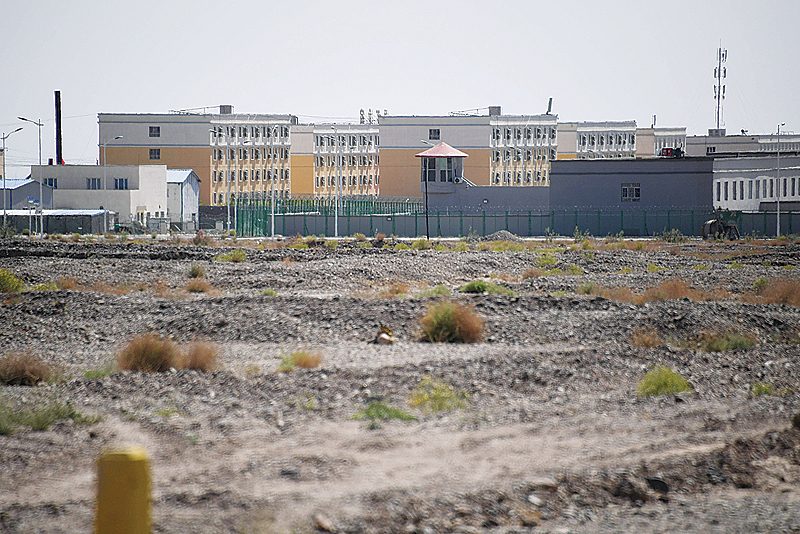People live happily in Xinjiang, Erdogan says
BEIJING: China accused the United States and Germany yesterday of making "baseless accusations" about its crackdown in Xinjiang during a closed-door meeting of the UN Security Council. Beijing has come under growing international criticism for placing an estimated one million ethnic Uighurs and other mostly Muslim minorities in internment camps in the northwest region.
China defends the facilities as "vocational education centres" aimed at teaching Mandarin and job skills to steer people away from religious extremism following a spate of deadly ethnic unrest in recent years. Chinese foreign ministry spokesman Geng Shuang confirmed a report that the United States and Germany raised the issue during a meeting related to Central Asia at the 15-member UN Security Council on Tuesday.
"The US and Germany deviated from the theme of this meeting, and made baseless accusations about China's Xinjiang policies. China is firmly opposed to this," Geng said at a regular press briefing yesterday. "China's ambassador to the UN, Ma Zhaoxu, severely refuted the wrong remarks of the US and Germany on the spot," Geng said. The spokesman said China will not allow "external forces" to interfere in its internal affairs, adding that the Security Council "should not become a political stage for certain countries."
Living happily in Xinjiang
Meanwhile, Chinese state media said Turkish President Recep Tayyip Erdogan told President Xi Jinping that ethnic minorities live happily in Xinjiang, in what would be a stark reversal of Ankara's past criticism of Beijing's crackdown in the region. Erdogan met Xi at the Great Hall of the People in Beijing on Tuesday, four months after the Turkish foreign ministry called the treatment of mostly Muslim Turkic-speaking Uighurs "a great embarrassment for humanity".
China has come under growing criticism over its security clampdown in the northwest region, where more than one million Uighurs and other mostly Muslim minorities are believed to be held in a network of internment camps. Beijing denies forcibly holding people in what it describes as "vocational education centres" where "trainees" learn Mandarin and job skills in an effort to steer them away from religious extremism.
Muslim countries had been largely silent about China's treatment of Uighurs until Turkey's statement in February, but the official Xinhua news agency reported nicer words from Erdogan on Tuesday. "Turkey stays committed to the one-China policy, Erdogan said, stressing that residents of various ethnicities living happily in Xinjiang Uighur Autonomous Region thanks to China's prosperity is a hard fact, and Turkey will not allow anyone to drive a wedge in its relations with China," Xinhua reported. "He also expressed the readiness to deepen political mutual trust and strengthen security cooperation with China in opposing extremism," it added.
China warns 'naive' Canada
In another development, China yesterday warned Canada not to be "naive" and believe that US pressure could help resolve thorny issues plaguing relations between Ottawa and Beijing. Prime Minister Justin Trudeau said Tuesday he was "confident" US President Donald Trump had brought up the cases of Canadians detained in China during weekend talks with President Xi Jinping at the G20 in Japan.
"Don't be naive and mistakenly think that mustering a certain so-called ally to put pressure on China will have an impact," Chinese foreign ministry spokesman Geng Shuang said at a regular press briefing. Ottawa "should not naively think its so-called ally will really exert itself on Canada's behalf", he said. "At most the (Americans) will move their lips a bit, because in reality this is an issue between China and Canada," Geng said at a regular press briefing. Relations deteriorated between China and Canada following the December arrest in Vancouver of Meng Wanzhou, a top executive at Chinese telecom giant Huawei, who is wanted by the United States for allegedly circumventing sanctions on Iran.
In moves widely seen as retaliation, Chinese authorities arrested two Canadians on national security grounds and blocked imports of Canadian agricultural products. Trudeau said he had spoken to Xi about ex-diplomat Michael Kovrig and consultant Michael Spavor during brief, informal exchanges on the sidelines of the G20 summit last week. Geng blamed Ottawa for the fraught relations. "Canada knows clearly what the crux of the issue is between the two countries," he said. "We hope that Canada will take measures to put China-Canada bilateral relations back on track as soon as possible," Geng said.- Agencies











